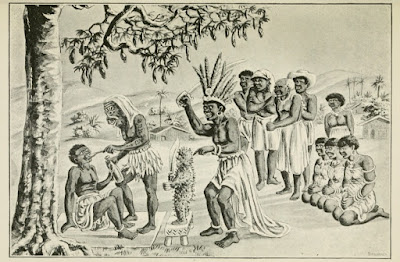How the Wives Restored Their Husband to Life
In this story, the man has three wives, and each of them has a special ability: one is the Dreamer (able to see in a vision-like dream how her husband died); one is the Guide (able to track down her husband's corpse); and the Raiser of the Dead (able to—bet you didn't see this one coming—bring her husband's corpse back to life). I like the idea of a trio with these supernatural abilities that combine into such a powerful united front, like three more proactive Fates. But since I've already done a story this semester about someone able to raise the dead, I'd probably either stick with a story about a Dreamer or a Guide.
How Gazelle Got Married
This time around, I was interested in the way the prince's dog was able to go around, completely underestimated because he was an animal, and gather useful information for his master. In a similar way, I think a story involving a very un-childlike kid instead of a dog could be worth telling; I'd probably use the kid as a central character but not a protagonist, and see what kind of trouble he could get into and out of in a crime story.
The Vanishing Wife
With this one, I was inspired by the way the protagonist experienced such a vivid dream, then woke up and followed the same steps that he did in the dream to make it come true. If I were to do a story sparked by this one, I think it would feature a protagonist who does the same thing with his or her dreams—but in a resigned, weary way, because this happens all the time, and they aren't exactly pleasant dreams.
Another Vanishing Wife
The bit that I found compelling in this story was the way the protagonist found himself drawn back to and wanting to please his family members again and again, even though he realized they weren't any good for him. That's the character seed I would narrow in on if I were to base my assignment this week off of this story, because I think it could lead to some meaty character conflict.
The Jealous Wife
Though there was plenty of family drama to draw from in this story, the thing that really grabbed my attention was the use of poison to put the mother to death after she killed her child. I think I'd carry the idea of poison over into my own story, though I'd probably take a loosely interpreted variation on it—maybe a character being literally poisoned, but also metaphorically, because the potion poisons them against someone. Maybe the protagonist even ends up poisoning this person, who she/he was once really close to, against herself/himself, kind of regretfully. It's a possibility, anyways.
Ngomba's Balloon
The fact that the murderer was (initially) so fond of the protagonist and careful with her feelings was intriguing to me, so that's what I'd like to incorporate into my story. It would probably feature a soft-hearted hitman and his ice-hearted girlfriend, just because that seems like a fun dynamic to play around with.
There were a few different inspiring elements to this story: the room full of mirrors to different places, the place no one had ever returned from, the old lady at that place who apparently welcomes visitors and then proceeds to strike them dead at the first chance. A short little horror story involving some of those elements could actually be a lot of fun, though I'm not sure if I'd have room to tell it for this assignment. But I also really loved the idea of a couple of twins being born with these natural abilities called charms, like they themselves are magic objects to be used. As usual, that's a pretty flexible interpretation of the charms in the source story, but I think it could be fun to experiment with.
The Younger Brother Who Knew More Than The Elder
In the shock of the century, the thing I found most interesting about this story was the dynamic between the two brothers; I loved the bit at the end where the older brother decreed that the neighbor was right and should go into the pit and kill the younger brother's wife ASAP, and the younger brother protested and tried to fight him, but the older brother only said, "Can you not yet trust your brother's superior wisdom? See, now, that male is in your trap; he is yours by agreement, even as your wife is his. Spare his life, and perhaps he will give you back your wife." And then the brothers and the wife went back to their own town. I like the idea of a cold, cunning older brother and a younger brother who can never quite bring himself to trust him, even when he wants to; I think it could lead to some interesting storytelling opportunities.
Bibliography: Notes on the Folklore of the Fjort by R. E. Dennett. Source: Mythology and Folklore UN-Textbook.
Image Credit: Illustration demonstrating the use of casca poison, by R. E. Dennett. Source: Haithi Trust Digital Library.

No comments:
Post a Comment